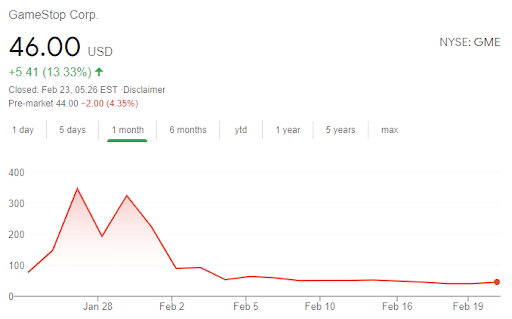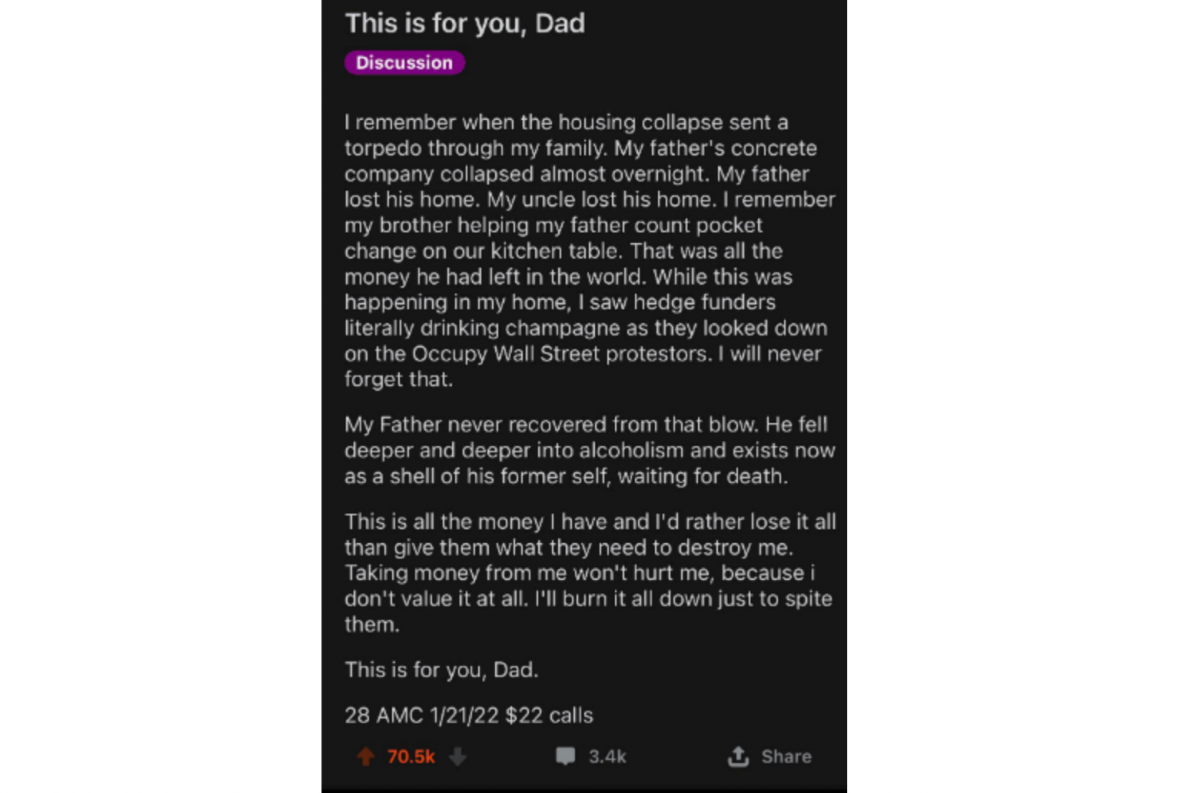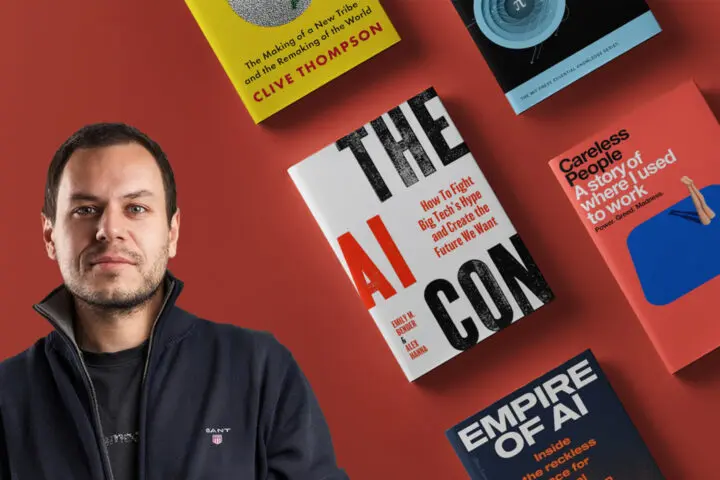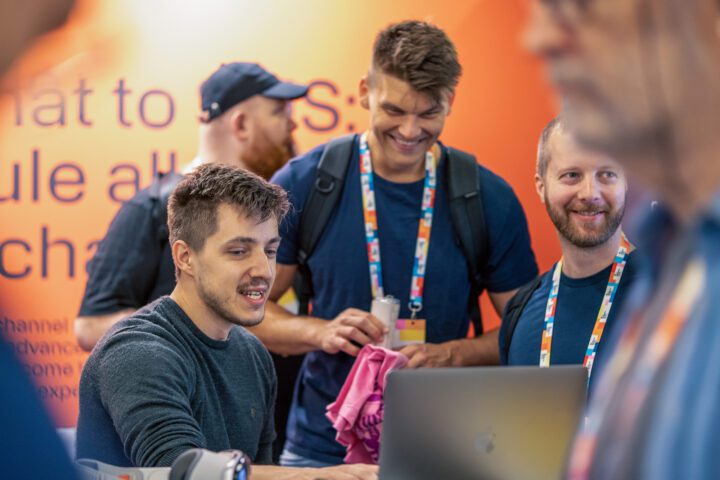3 Investment lessons from online pumps & dumps
The beginning of 2021 and the current crypto carousel once again reminded us that social networks are not a good advisor for investing.
Do you remember the movie TimeCop? Especially the scene where a sleazy broker lifts his feet on a heavy table and reads through the New York Times in search of a new investment opportunity?
The viewer assumes he came from the future and will make a big profit on a future transaction while smiling like a true villain. But then, a wormhole appears from which Van Damme runs out and slaps the arrogant financier with one Mae Geri. “Easy there, bandit!“ Jean Claude doesn’t stop there and says: “I was looking for you in 2021. Didn’t you see that GameStop rose 1600 percent !?”

We can now see that the GameStop [$ GME] monthly curve looks like the Everest, and the basics are already known (thanks to young Ivan): a horde of asynchronously orchestrated Reddittors initiated a short squeeze and thus generated an epic migraine for hedge fund managers who were betting on the $GME collapse.
Bet on collapse? Short Squeeze? Hedge what!? We’ll touch upon those terms, but I won’t bother you too much with the GameStop story. Another long-term narrative is more interesting – a significant role in the whole action was played by social networks and the virtual organization of hacktivists who were better organized than some midnight World of Warcraft raids.
This revolutionary march also exposed the danger of social networks – hundreds of small (retail) investors bedazzled by $GME shares will probably never return the investment (right part of the graph + stock estimate at the end of the text). And that brings us to three well-known investment maxims, also applicable to the crypto market roller coaster:
(A) Separate emotions from investing.
(B) Don’t invest in something you don’t understand.
(C) Only invest money that you can lose.
(A) Separate emotions from investing
Rorschach effect: Everyone sees what they want to see
It’s not the first time that social networks had an impact on the capital market and cryptocurrencies (ETH and BTC are currently undergoing a major correction, and CREAM is being attacked by hackers who took 37M USD). Any discussion on social media is essentially a distributed Rorschach test. Everyone sees what they want to see (and everyone feels invited to participate in the discussion).
Such forum quarrels are harmless when you are ardently fighting for or against lockdown (where everyone suddenly got an epidemiology Phd). Things are getting complicated when you decide to invest your own money based on online comments.
A typical example is the “This is for you Dad” $GME thread where an angry Redditor calls for a revolutionary march against hedge funds. The call is clear to understand because; let’s be real, scenes of trembling wolves from Wall Street loosening those tightly clenched ties will cheer everyone up; especially if you started a company in the midst of a major financial crisis and felt the cold reality of the established financial sector on your own skin (and how little it actually provides).

And here comes the irony no.1 – in 2008 we witnessed how Michael Burry (who was masterfully screened by Christian Bale in “The Big Short” movie) and his colleagues use short positions to harm hedge funds in the Don Quixote style. But when that reverses in 2021, the shortening is portrayed as an alleged evil!?
To add to the irony, it turns out that the background of the Reddit march was not so revolutionary. Post-mortem analyzes show that other hedge funds (!) and institutional investors who actually detected the weakness and lured small RobinHood / Revolut investors to play their dirty game are responsible for the demolition of funds (specifically, Melvin Capital). However, Aswath Damodaran and Mario Gatara, who wrote about this topic in more depth, indicate that the Redditors influence share were only 30%.
Echo Chamber effect: I don’t need (and want) your opinion mate
An additional complication in investing is the well-known echo chamber effect that goes hand in hand with Rorschach.
A crypto example…
The concept of Pi Network blockchain is truly magical – you download the app and it silently mines Pi cryptocurrency in the background. Then the Rorschach effect strikes – some have seen “Free Money !!!”; and others were thinking… “Hmm, so how is that possible? Don’t you need noisy ASIC machines and trellis of heated GeForces to mine cryptocurrencies? ” Pi Network has grown to 10 million members, organized into pioneers, ambassadors and contributors who all supported each other and talked about the beauties that Pi Network provides. Queue in Tupperware, Herbalife and Amway.
The local media trivialized it (can I buy eggs with Pi !?) but then Ivan Voras and Bruno Škvorc (UBIK) decided to write a detailed and above all excellent analysis and exposed the whole scheme. It turns out that the creators of the Pi Network blockchain “designed” their upgrade of the Stellar Consensus Protocol (SCP) where the chain of blocks is checked by a global graph of trust, ie. a social bond between community members. Mhm.
The creators of the Pi Network system actually powered a central server with an unknown source code that collects private data and connections among users, for which it rewards them with generated coins displayed on a native mobile application (you can’t go to classic crypto exchanges with Pi).
The community of Pi enthusiasts formed within the FB group simply did not believe the arguments about the pyramid scheme and blindly continued to ride this “innovative crypto wave”.
And you know what is the fundamental problem with such online discussions, aided by the echo of like-minded people? They can move the price of a stock or some cryptocurrency away from its fundamentals (basic market values) and thus attract uninformed observers to shop or some third unfortunate action (reckless sale, leaving personal data, influence on third parties…). That is why it is necessary to separate emotions from investing, the most obvious example of manipulators and characters with an agenda is yet to come…
(B) Don’t invest in what you don’t understand (the story of the political Ambulance Chasers)
The first two layers of the cake (Rorschach + Echo chamber) provide a stable base for the coating of agendized characters that follows. No need to go further than Elon Musk’s pander tweet who claims that short selling is evil!
u can’t sell houses u don’t own
— Elon Musk (@elonmusk) January 28, 2021
u can’t sell cars u don’t own
but
u *can* sell stock u don’t own!?
this is bs – shorting is a scam
legal only for vestigial reasons
I know this is the fifth time you’ve read about short selling, but hold on a little longer so we can process the whole enchilada.
At the flea market
Short selling is the sale of the asset you borrowed – I borrow a pound of apples from the grocer and promise (contract) that I will return a pound of apples after X days. Nothing more and nothing less. But here comes the business opportunity – if I believe the price of apples will fall (let’s say I “have a feeling” that people will nibble on watermelons over the summer) I can sell those apples on the same day I borrowed them. When the day comes that I have to return the apples, I go to the market, buy apples and return them as I promised. As long as there is a difference between the sale price and the purchase price, there will be a profit for me.
However, if I believe that the apple industry and their price will grow, I immediately contact the broker, buy and hold that apple stock. I can also start a more lucrative operation – I go to the bank, take a loan, start an orchard and sell apples at a price that I consider to be a reflection of the quality of my apples. Again, the difference between the selling price of apples and the loan rate for the cost of the orchard remains to me as a profit.
And speaking of the difference, let’s mention another one – the asymmetry of possible loss. Short selling is an extremely risky position. As long as I see a stock / crypto growing, I buy it and hold it. The maximum loss that can happen in that scenario is that it falls from the invested X dollars to 0 dollars (the range of possible loss is known to me in advance). With short selling, however, the loss could be much greater since I can’t predict how many stocks will increase and how much loss there will be. Apples, for example, can be 5x, 8x, 13x or 21x more expensive on the day I have to buy / return them.
Why doesn’t Elon like shorting?
Described situations are socially harmonized economic dynamics, rather than evil and immoral actions. The risk, the headache, the worry, and the outcome assessment in both cases are just mine – as well as the potential gain (don’t be naive – even that grandma grocer understands why she lends me apples at that moment).

Additional “anger” on social media was created when hacktivists from Reddit linked short selling with the formation of fund cliques and cartels, claiming that the funds were colluding to artificially bring down GME stock prices in the so-called “Short & Disrupt” operation. This may be the case, but it is not reserved for short selling. The same cliques and cartels are formed illegally in the so-called long positions, i.e. when funds bet that the stock price will rise. Such an operation is called “Pump & Dump” and is far more common in capital markets.
However, not everything is so bad – short selling has a positive effect on the capital market because “tests” loopholes in companies. Capital market participants that are short for certain stocks have every reason to sniff loopholes in the company and thus increase the transparency of the capital market. And that’s what’s been actually bothering Musk – Elon has been battling short sellers for a long time trying to bring down the price of Tesla shares, reducing his possible compensation plan.
Tesla’s share is one of the most “short” shares where short squeeze was done at least five times (with the last one being at the beginning of 2020). But it is hypocritical for him to argue that short selling, like normal market dynamics, is evil.
Because, look – when Elon Musk builds Tesla, he borrows money he doesn’t own. And then he uses that money to buy parts he doesn’t want to own. He puts those parts on a car he also doesn’t want to own. And then Elon sells the car to someone who really wants to be the owner. I don’t even have to mention that the person who buys Tesla most likely does it through a loan, i.e. money he does not own. So wait a minute, doesn’t this all sound like “shorting”?
I’ve gotten too caught up in finances but I hope you get the point. Don’t invest in what you don’t understand! And if you don’t understand, educate yourself – Elon Musk, AOC and other caretakers will rush to the media wave for their own agenda, and falling for such ambulance chasers is just a way to lose savings.
(C) Only invest money that you can lose
In the above sections, we described the impact of society on investment and how to more accurately monitor discussions about investing. The good news is that the state and institutions do protect investors to some extent. Regulatory protection applies to the stock and basic savings markets, but does NOT apply to one fresh market that is experiencing a boom again– cryptocurrencies and DeFi.
Decentralized, anonymous and some “anarchy” layers of cryptocurrencies have another side of the coin – no one can technologically regulate or control them. Forget about Robinhood’s “safe triggers” which actually saved a good part of small investors in GameStop, forget about the savings that banks and the state provide you in the amount of up to 100,000 EUR.
If you lose a private key from a crypto wallet or send an ETH to the wrong address, there is no such regulator or insurance that will refund your money. I mean, you can launch a 51% attack on the Ethereum network for the purpose of modifying transactions, but one hour of such an attack will cost you approx. 420,000 USD.
Only the mother of all maxims can save you here – invest only the money you can lose.
Unfortunately, you won’t find a quick answer on how much money you stand to lose, but the solution lies in ongoing education and market monitoring. I have selected a couple of sources for quality financial education that is currently offered for free and that will definitely help:
Blogs and authors:
- Arhivanalitika, ie. The Economic Lab currently has the highest quality articles in the field of investment, finance, macroeconomics, and “sometimes” it also deals with pandemic topics. Articles by Velimir Šonja and Maria Gatara are a special treat, but I warn you that these are “heavy” long-reads.
- Tetka (Sandra Ferenčak) is a blog that deals with investing, pensions, insurance and finance in general with one interesting premise – “financial freedom is a prerequisite for other freedoms” (which I guess most of us agree with). Unlike Arhivanalitika, these readings are intended for a wider audience.
- Aswath Damodaran is a professor of investment and valuation companies at NYU. Mr. Professor predicts that the real value of the GameStop stock is $ 47 (kudos, that is the current stock status as I write this), and Damodaran’s layered analyzes can be read on his Blog (Spot).
- Ray Dalio (Bridgewater) is an inexhaustible source of diverse analyzes and reviews of capital and cryptocurrency markets. For example, Ray and his team predict a possible rise in the price of Bitcoin to $ 85,000, which is a rather bold but well-supported claim.
- Around the Block is an educational blockchain series by Coinbase with a strong emphasis on decentralized finance. Be sure to follow the blog as the team continually brings theories and basics of investing in cutting edge financial instruments.
Associations, events and meetups:
- UBIK association is continuously working on the promotion of cryptocurrencies and blockchain technology, and on their site you can find a blog with a variety of topics. The meetup is held every month, and the last two included topics like Ethereum 2.0, the state of the DeFi industry, the Neat protocol, and so on.
- Clubhouse basics, thanks to the older Ivan, we all know: the app has a handful of virtual rooms where you can listen live to expert panels on the topic… well, anything. Especially on cryptocurrencies, investing in classic stocks or DeFi instruments. Please comment if you need the invitation to this new social network (only if you have read the first two sections of the text, of course:)).
Podcasts:
- Surove strasti is the best podcast to learn about entrepreneurship, business and investment. I would like to single out great episodes with Filip Šaravanja, Velimir Šonja and Sandra Ferenčak (Tetka).
- Blockchain from the Block is a podcast that specifically deals with DLT (Distributed Ledger Technology), and is led by Luka Sučić and the already mentioned older Ivan (Brezak Brkan). A strong suit of this podcast are the topics referring Balkan scene and regional superstars rather than global stories.
- Of course, give a chance to the new Nominis podcast directed by eCommerce Croatia and Neuralab. The podcast covers online business, technology investment and entrepreneurship where you can also learn tricks and secrets directly from CEOs and owners of various companies.
- Postlight Podcast is a podcast of the New York agency Postlight (go figure). They cover the topics such as the impact of technology on business, the development of online services and the combination of finance / technology. For example, the guest of one episode was Cathy O’Neil (Weapons of Math Destruction) who tells the story of the 2008 Wall Street embezzlement and how they mathematically packaged the famous “credit default swaps” + pasted Triple-A investment ratings on them. The hosts are tech industry veterans Rich Ziade and Paul Ford who otherwise writes great articles for Wired.
Continuous education with headphones, a blanket and the above materials is the best way to protect yourself from unnecessary losses, because no one else will do it for you, especially not in crypto markets. And for the end of this winter story…
“To shorten winter, borrow some money due in spring. “
— W. J. VOGEL







